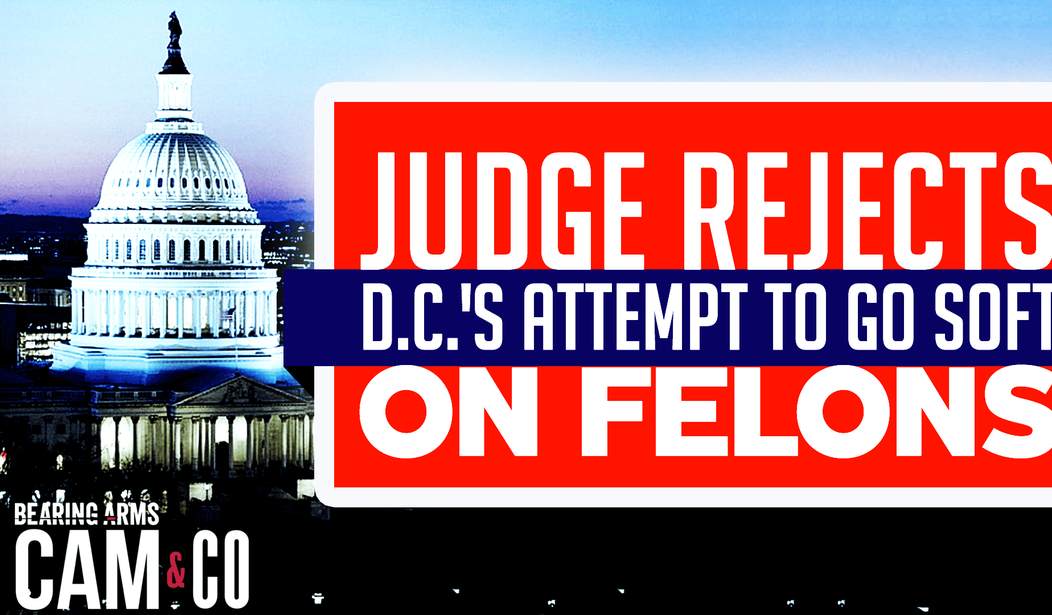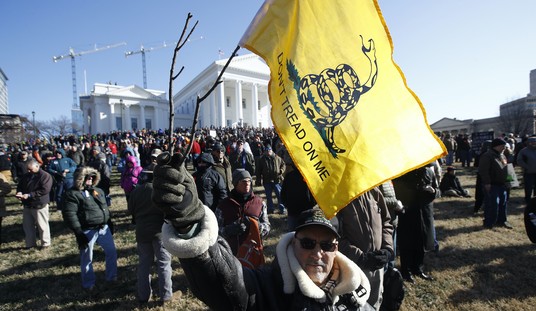During the Trump administration, the Department of Justice unveiled a strategy to reduce violent crime in our nation’s capitol by bringing some felon-in-possession cases to federal court rather than letting local prosecutors in D.C. handle the cases. Defendants in D.C. Superior Court are far more likely to receive reduced sentences or even probation for their crime, but rather than welcome the move to take violent offenders off the streets many District officials complained that the policy was racially biased and discriminatory.
Two men arrested and charged in federal court actually sued over the policy and received a lot of support from the left, with 90 or so former federal prosecutors and the D.C. chapter of the ACLU siding with the pair in their quest to throw out their federal convictions. On Monday, however, U.S. District Judge Emmet G. Sullivan ruled that the federal government did not overstep its authority in prosecuting the two men, and can continue to bring D.C.-based cases to federal court despite the city’s “home rule” status.
Notwithstanding the District’s long campaign for a locally appointed top prosecutor, the federal government has reserved the power to prosecute felonies in the nation’s capital to the presidentially appointed U.S. attorney, the judge said.
“It is clear that Congress granted the District the authority to enact local criminal laws, subject to Congress’s right to repeal, and therefore control over local penal policy, but also that Congress has expressly excluded the U.S. Attorney’s Office from the checks and balances of the D.C. government,” Sullivan continued.
“Ultimately, ‘nothing in the language, structure, or legislative history of’ either [the Court Reform Act or the Home Rule Act] suggests that the U.S. Attorney should choose to prosecute one offense over another,” he concluded.
However, Sullivan ruled that judges retain broad discretion at the time of sentencing and can apply both federal and D.C. sentencing guidelines, within certain limits.
On today’s Bearing Arms’ Cam & Co we discuss Sullivan’s ruling and what it means in the District of Columbia. I happen to think the judge made the right call from both a legal and a practical perspective. Legally, of course, there’s nothing preventing the federal government from taking a case that involves a violation of federal law, even though Congress did approve several laws in the 1970s meant to relieve an overburdened judicial system in Washington, D.C. As Sullivan pointed out in his decision, those changes did not involve blocking the federal government from prosecuting certain crimes in the District.
Thus, while Congress’s enactment of the two statutes in the 1970s substantially altered the organization of both the local government and the court systems in the District, Congress chose to keep intact the long-standing authority of the U.S. Attorney’s Office to decide whether and how to prosecute the majority of crimes committed in the District.
Accordingly, the U.S. Attorney’s Office in the District of Columbia enjoys a unique role among federal prosecutors in the United States. While other states and cities select the officials who will prosecute local crimes, Congress has determined that in the District of Columbia (“the District” or “D.C.”), it is the U.S. Attorney who has the authority to prosecute essentially all D.C. Code felonies and most D.C. Code misdemeanors.
From a practical perspective, this is good news for District residents, or at least it would be if D.C. wasn’t run by a bunch of far-left ideologues who are more interested in putting new gun control laws on the books than prosecuting violent felons caught illegally possessing guns. A key part of any targeted deterrence policing strategy involves identifying the most prolific and violent offenders and prosecuting them to the fullest extent of the law; something that simply doesn’t happen all that often in D.C. Superior Court.
However, another critical component of a successful targeted deterrence effort involves cooperation between local and federal officials in going after these hardcore offenders, and there doesn’t seem to be much interest among the District’s political class to actually get tough on the relatively small number of individuals who refuse to change their behavior despite repeated arrests and convictions in Superior Court. The feds may have the authority to prosecute felon-in-possession cases in Washington, D.C., but don’t expect anti-gun politicians like Muriel Bowser to be happy about it. As much as she might talk about wanting to reduce violent crime, she and the other Democrats who dominate D.C. politics are far more interested in targeting guns than any violent felons caught with one.








Join the conversation as a VIP Member